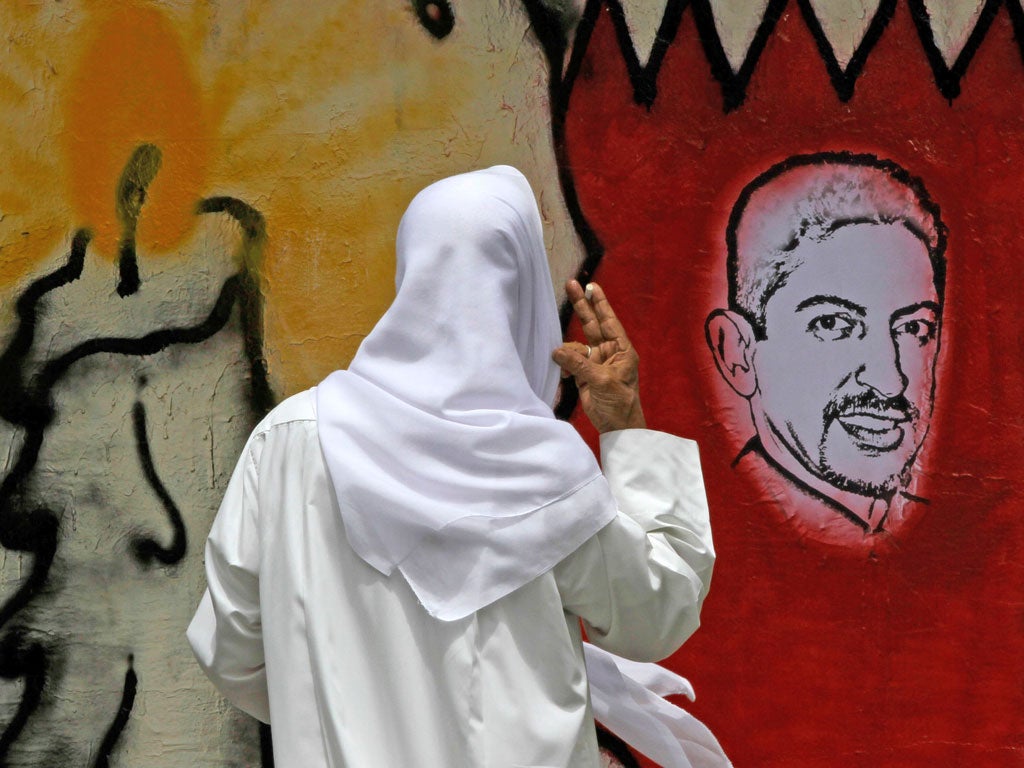Bahrain court orders retrial for hunger striker Al-Khawaja
Activists warn ruling for 21 jailed dissidents may be attempt to deflect international criticism

A group of jailed Bahraini dissidents were who were handed lengthy prison sentences by a secretive military tribunal last year were given hope today that their convictions might be overturned after the country’s highest court ordered a civilian retrial.
But relatives and opposition politicians have greeted the gesture with caution telling The Independent that the troubled Gulf kingdom’s civilian courts have attracted widespread scepticism when it comes to guaranteeing fair trials during highly politicised cases.
Yesterday’s ruling refers to 21 opposition leaders who were convicted last year of organising mass protests led predominantly by Bahrain’s majority Shi’a population against the kingdom’s ruling Sunni al-Khalifa dynasty. Despite a widespread crackdown, mass arrests and the deaths of more than 50 people, the protests show little sign of abating.
The group of jailed activists include some of the county’s most prominent dissidents such as the imprisoned hunger striker Abdulhadi al-Khawaja and Hassan Mushaima, one of the founding father’s of Bahrain’s Shi’a opposition. In recent weeks al-Khawaja has become a beacon for the opposition movement after he began refusing all food until he and his fellow prisoners were released unconditionally.
He has been moved to an undisclosed location and his family have claimed that the Bahraini authorities are feeding him intravenously against his will. Bahrain’s government, which has come under enormous international pressure as a result of the hunger strike, has denied the allegations.
This morning the country’s Cassation Court ruled that the group should be retried on a civilian chamber, overturning their previous conviction in a closed-doors military tribunal. However the court insisted that the group must remain in detention until a new trial date can be set.
Mattar Ebrahim, a member of the Shi’a opposition party al-Wefaq and a former MP, told the Independent that he had little faith in the civilian judiciary.
“They are simply replacing one unfair judicial system with another,” he said. “This is not just my view, this is the finding of numerous independent NGOs and human rights organisations who have looked at the civilian courts.”
Earlier this year Human Rights Watched published a report investigating Bahrain’s judiciary in which it concluded that "civilian criminal courts have shown themselves to be little better than the military courts in providing fair trials in highly politicized cases.”
Mr Ebrahim added: “You have to remember that even before the protests last year the civilian court system was the major court used by the regime to stop dissent. It has always been used to attack opposition groups by fabricating criminal charges against people. The regime always says it doesn’t have political prisoners in Bahrain and in some ways that is true – because they always charge political people with made up criminal offences.”
Al-Khawaja’s daughter Maryam said she believed the civilian retrial was simply an attempt to deflect recent international criticism.
“They want to diffuse the external pressure,” the told The Independent by telephone from Lebanon. “They will try to drag the case on for as long as possible – citing due process – in the hope that they will be forgotten about. The same thing has happened with the Bahraini doctors.”
Miss al-Khawaja was referring to fifteen Shi’a doctors who were sentenced last year by a military court to between five and 15 years in jail for a string of criminal charges that were widely deemed to be political. After widespread international condemnation a civilian retrial was later reordered and has been slowly working its way through the judicial system over the past three months.
Of the 21 jailed opposition politicians, eight members including al-Khawaja and Hassan Mushaima, were sentenced to life in prison. Al-Khawaja’s other daughter Zainab has also been held in detention for the past week after she was arrested following a peaceful protest against the recent Formula One race.
The main charges used to convict her father and his fellow dissidents last year was “forming a terrorist group with intent to overturn the system of government”. Many were also charged with working on behalf of a foreign state, a reference to Bahrain’s Shi’a neighbour Iran.
The Bahrain government, which is dominated by Sunnis, has previously accused Tehran of trying to foment trouble in its island neighbour but opposition groups in the kingdom insist that they are entirely independent.
Subscribe to Independent Premium to bookmark this article
Want to bookmark your favourite articles and stories to read or reference later? Start your Independent Premium subscription today.

Join our commenting forum
Join thought-provoking conversations, follow other Independent readers and see their replies